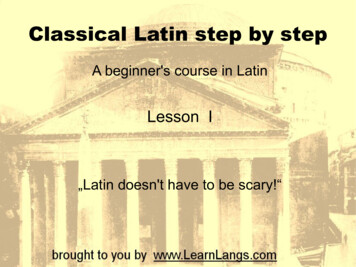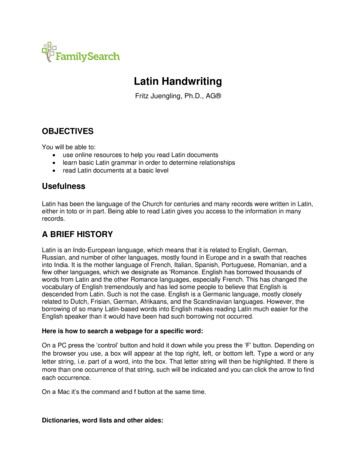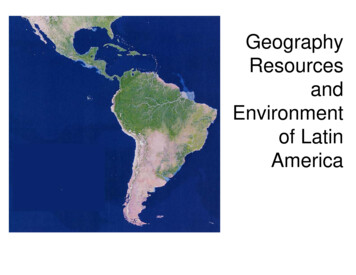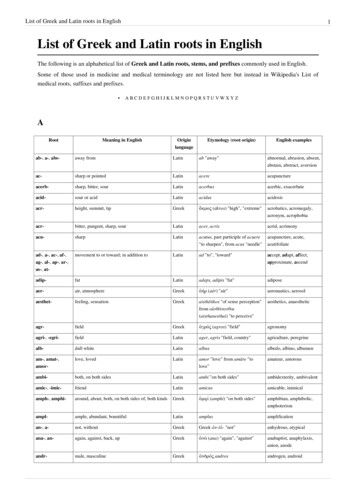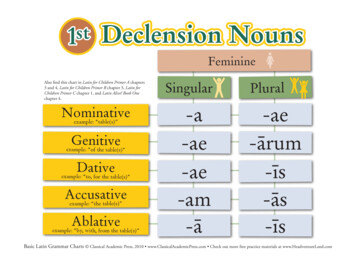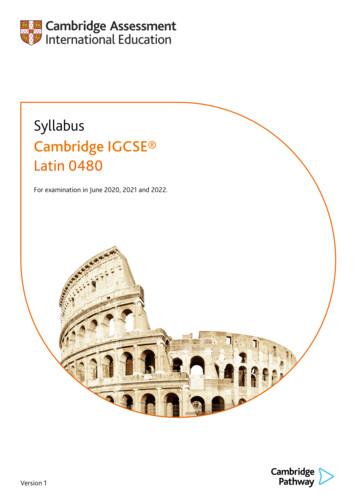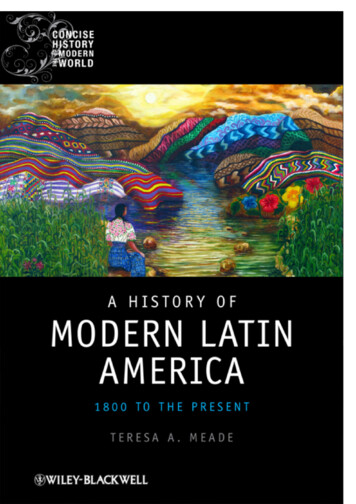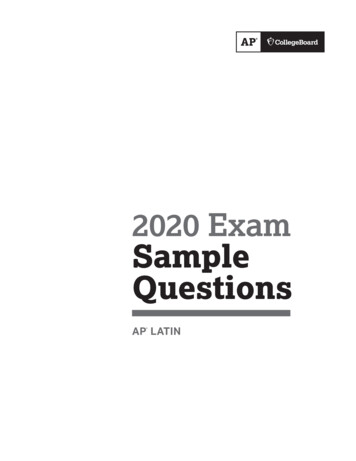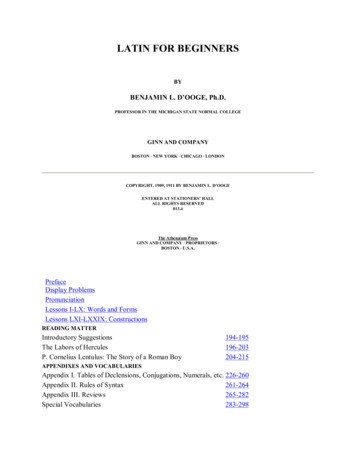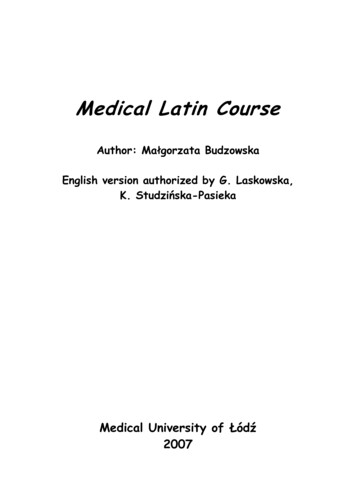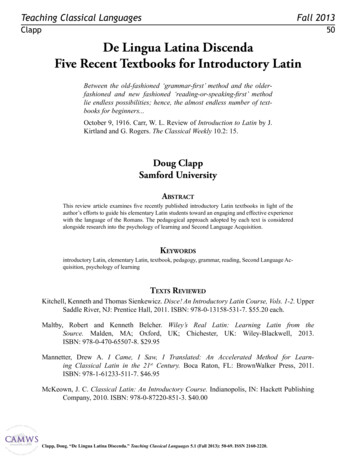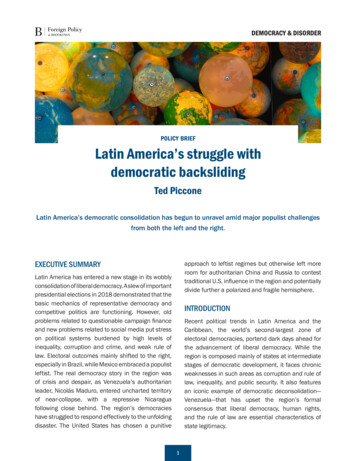
Transcription
policy briefLatin America’s struggle withdemocratic backslidingTed PicconeLatin America’s democratic consolidation has begun to unravel amid major populist challengesfrom both the left and the right.EXECUTIVE SUMMARYapproach to leftist regimes but otherwise left moreroom for authoritarian China and Russia to contesttraditional U.S. influence in the region and potentiallydivide further a polarized and fragile hemisphere.Latin America has entered a new stage in its wobblyconsolidation of liberal democracy. A slew of importantpresidential elections in 2018 demonstrated that thebasic mechanics of representative democracy andcompetitive politics are functioning. However, oldproblems related to questionable campaign financeand new problems related to social media put stresson political systems burdened by high levels ofinequality, corruption and crime, and weak rule oflaw. Electoral outcomes mainly shifted to the right,especially in Brazil, while Mexico embraced a populistleftist. The real democracy story in the region wasof crisis and despair, as Venezuela’s authoritarianleader, Nicolás Maduro, entered uncharted territoryof near-collapse, with a repressive Nicaraguafollowing close behind. The region’s democracieshave struggled to respond effectively to the unfoldingdisaster. The United States has chosen a punitiveINTRODUCTIONRecent political trends in Latin America and theCaribbean, the world’s second-largest zone ofelectoral democracies, portend dark days ahead forthe advancement of liberal democracy. While theregion is composed mainly of states at intermediatestages of democratic development, it faces chronicweaknesses in such areas as corruption and rule oflaw, inequality, and public security. It also featuresan iconic example of democratic deconsolidation—Venezuela—that has upset the region’s formalconsensus that liberal democracy, human rights,and the rule of law are essential characteristics ofstate legitimacy.1
DEMOCRACY & DISORDERLATIN AMERICA’S STRUGGLE WITH DEMOCRATIC BACKSLIDINGNow, as Venezuela and its allies (Bolivia, Nicaragua,and Cuba) enter a new stage of crisis and change,a solid bloc of the most important states in theregion are contesting their neighbors’ electedauthoritarian model out of growing concern forinstability and contagion. Results to date, however,have proven disappointing as most states copewith their own troubling performance on democracyand rights. As populists and strongmen politiciansemerge on the right and the left, can centrists movequickly enough to meet the demands of frustratedpopulations who have grown increasingly skepticalof democratic systems’ ability to improve theirlives?the latest wave of electoral contests demonstrates,however, political competition in most of the regionis relatively robust.Regional averages, however, are misleading. On thekey democracy-related indices, Chile, Uruguay, andCosta Rica consistently have performed markedlybetter than their neighbors. Liberal democracyin Venezuela, on the other hand, has tragicallycollapsed.2 Nicaragua, already a sub-par playerunder the Daniel Ortega regime, is undergoing amajor and violent crisis of democratic legitimacy.Bigger countries like Brazil, Argentina, and Peruare facing their own stress tests as they confronta series of grand-scale corruption scandals andeconomic setbacks.These challenges are not occurring in a vacuum.The broader geopolitical dynamics affecting theregion—increasing reliance on China as a keyeconomic partner; the growing activism of Russiain allied states such as Venezuela and Cuba; thedecline of the United States and Brazil as dominantpowers; and the renewed economic and politicalinvolvement of European actors—on balancerun against the region’s much-needed progresstoward more stable democratic governance. Thispolicy brief will examine the interrelated domesticand international factors that shape the region’suncertain democratic trajectories and theirimplications for domestic actors, internationalinstitutions, and foreign governments.The sources of these ongoing challenges toLatin America’s democratic development, threedecades after the fall of military regimes, arechronic and structural. Corruption in the region,usually characterized as endemic and entrenched,is higher than global averages and is stagnant,according to the latest reporting from TransparencyInternational.3 Respect for the rule of law andjudicial independence notably has improved since1980, but has plateaued below global averagesover the last decade.4 Violent crime—Latin Americahas roughly a third of the world’s homicides but onlyone-eighth of its population5—is overwhelming localauthorities and is beyond national governments’ability to control, and is leading them towardmilitarized approaches to law enforcement withnegative effects on human rights and due process.6Rates of homicide against human rights defenders,social minorities, and women are well above globalaverages. The region’s notoriously high rates ofinequality (among the world’s highest7), informallabor markets, and regressive tax rates enfeeblepublic resources needed to address income gapsand citizen insecurity, and fuel resentment andanger toward elites.THE STATE OF DEMOCRACY: SHAKY ANDUNEVENAs a whole, Latin American and Caribbean stateshave performed better on liberal democracyrankings than all other regions outside of WesternEurope and North America since the third wave ofdemocratization began in the 1980s. In particular,the 18 Latin American countries running from Mexicoto Chile (and east to the Dominican Republic) havereached on average a moderate level of democraticgovernance.1 More recent trends, however, showtroubling erosion of this progress, along with higherrates of public frustration with its performance. As2
DEMOCRACY & DISORDERLATIN AMERICA’S STRUGGLE WITH DEMOCRATIC BACKSLIDINGThis toxic combination of high rates of crime,corruption, impunity, and inequality is exhaustingthe region’s historic shift over the last threedecades away from military control to civilian-ledliberal democratic systems. Many components ofhealthy democratic governance—public campaignfinancing,8 independent media,9 strong checksand balances, rule of law, and civil liberties—areunder stress or stagnant. Scores for freedomof expression10 have declined and attacks onjournalists are among the world’s deadliest,especially in Mexico and Brazil.11 The usual toolselites have used to shape democratization totheir advantage—political finance, patronage,and media ownership—are losing their power andno clear substitute is emerging to rebalance thesystem, opening the door to populists and neoauthoritarians.illegality. Moreover, trust in electoral systems and inpolitical parties is at or near historic lows,15 leavingample room for populists to win votes throughpersonality contests and demagoguery.LATEST ELECTION RESULTS LEAN ANTIESTABLISHMENTThe heavy concentration of presidential andlegislative races in 2017 and 2018 throughout theregion provided important indicators of the currentstrengths and weaknesses of Latin America’sdemocratic systems. As expected, Chile and CostaRica experienced more stable results, although thelatter contended with a surprising surge of supportfor an evangelical populist who won the first roundvote by attacking a decision of the Inter-AmericanCourt of Human Rights on LGBTI rights, as wellas a rejection of the two traditional parties.16 Theelection of Nayib Bukele in E Salvador in early 2019underscored the anti-establishment wave carryingpopulist newcomers to power.Not surprisingly, public frustration with the qualityof representative democracy is rising in a numberof recent surveys. In 2018, regional support fordemocracy over other forms of government fellto 48 percent, tying the lowest level since thequestion was first asked in 1995.12 According to arecent AmericasBarometer survey of 29 countriesin the region, publics are highly dissatisfied withthe delivery of basic public services that underpincitizen satisfaction with liberal versus authoritarianrule. Support for electoral democracy has declinedfrom 69 percent in 2012 to 58 percent in 2016-17,while those that believe high levels of crime and/or corruption would justify a military coup averagearound 37 percent. Similarly, support for executivecoups in which presidents shut down legislatureshas risen from 14 percent in 2012 to 21 percentin 2016-17.13 According to a Pew Research surveyin 2017, 24 percent of those surveyed in sevenLatin American countries were willing to considernondemocratic options, the highest median regionalresponse in favor of autocratic governance.14 Giventhe high perception and prevalence of crime andgross corruption in certain countries in the region,this may be yet another indicator of the public’sgrowing tolerance for strongman rule to tackleColombia’s electoral contest in June 2018, thefirst since the country’s adoption of peace accordsending five decades of conflict with its largestrebel faction, drew higher rates of participation(at 53 percent, the highest in 20 years but stillbelow the regional average). The electoral process,according to the Organization of American States(OAS) observation team, was both free and fairand electoral violence reached historic lows.17 Aconservative candidate close to former PresidentÁlvaro Uribe who campaigned against the peaceaccords won the top office, but his left-wingopposition did better than any previous candidatein Colombia’s democratic history. In an echo of thecollapse of centrist parties in Europe, the incumbentparty of outgoing President Juan Manuel Santoscame in a distant third.18The two big contests of the year—in Mexico andBrazil—led to the election of two populists fromopposite ideological poles. In July 2018, 63 percentof eligible Mexicans turned out to elect a well-known3
DEMOCRACY & DISORDERLATIN AMERICA’S STRUGGLE WITH DEMOCRATIC BACKSLIDINGleftist, Andrés Manuel López Obrador (known by hisinitials as AMLO), with a convincing 53 percent ofthe vote. AMLO won based on appeals to populardemands for fighting rampant corruption and crime,tackling poverty, and improving public services. Theincumbent PRI party, which governed Mexico for 77of the last 100 years, fell dramatically to third place,reflecting voters’ anti-establishment mood. AMLOhas promised to govern within the establisheddemocratic rules of the game, a claim his immediatepredecessor, Enrique Peña Nieto, had troublemaking.19 With a strong majority in both chambersof congress, AMLO should be able to enact a seriesof changes that might temper the political andeconomic liberalization reforms enacted since the1990s. Given these internal challenges, his foreignpolicy is likely to be pragmatic vis-à-vis the UnitedStates, while also playing to his growing popularityamong the democratic left in the region and todomestic groups in favor of economic nationalismand nonintervention in neighbors’ affairs.military officials to key cabinet posts and a staunchpro-Trump nationalist as foreign minister suggest aburgeoning alliance with illiberal forces at home andabroad. Together, Bolsonaro’s Brazil and AMLO’sMexico, despite their ideological differences, mayfurther weaken any serious pro-democracy, prointernationalist leadership from the region.VENEZUELA IMPLODES AND NICARAGUAERUPTSVenezuela’s recent history stands out as thequintessential example of what can go wrong whena populist strongman, appealing to majoritariandemands for change, wins office through relativelyfree and fair elections then proceeds to dismantlethe fundamental pillars of liberal democracy.Hugo Chávez, once imprisoned for leading afailed military coup against his democraticallyelected government, rode a wave of discontentwith Venezuela’s traditional ruling class in 1998 tolaunch a socialist “Bolivarian” revolution aimed atredistributing the country’s vast oil wealth to fightpoverty and inequality. Despite years of massiveprotests, a failed coup attempt, strikes, and anattempted recall referendum, Chávez consolidatedhis power by rewriting the constitution, gainingcontrol of the judiciary and other institutions,repressing independent media and civil society,and redistributing proceeds from high oil prices tokeep his followers on board. His premature deathfrom cancer in 2013 after multiple hospital staysin Cuba, his closest ally and ideological partner,cemented a personality cult that continues toreverberate in Venezuela and beyond.The remarkable results of elections in Brazil werepractically a mirror image of Mexico’s, with the rightwing populist, Jair Bolsonaro, winning a resoundingvictory by running against establishment elites andin favor of strong anti-corruption and anti-crimepolicies. After the tumultuous impeachment inAugust 2016 of the country’s first female president,Dilma Rousseff of the Workers Party (PT); ongoingprosecution of top politicians and businessexecutives in massive corruption schemes; anda painful recession, the anti-PT mood dominatedthe race. Bolsonaro, a plain-talking conservativenationalist and former army captain known as “theTrump of the tropics,” will likely govern through apatchwork coalition of pro-free market businessgroups, pro-military and evangelical conservatives,and unorthodox pro-Trump nationalists. Publicstatements by him and his allies denigratingwomen, social and racial minorities, civil societyactivists, and journalists, alongside threats tounleash lethal force against so-called terroristsand criminals, portend dark days ahead for Brazil’sdemocracy. Bolsonaro’s appointment of seniorChávez’s anointed successor, Nicolás Maduro, hasdoubled down on his legacy to maintain control atall costs. After narrowly winning elections a monthafter Chávez’s death, Maduro quickly consolidatedcontrol by digging even deeper into state resourcesto buy off the military, nationalize industries, andprovide subsidized food and jobs to party loyalists.When challenged by the opposition-controlledlegislature, Maduro ignored their decisions and4
DEMOCRACY & DISORDERLATIN AMERICA’S STRUGGLE WITH DEMOCRATIC BACKSLIDINGestablished a rival constituent assembly to usurptheir powers. Maduro also stage-managed anunfair re-election contest in May 2018 that over 50states have declared illegitimate.20 The result is afull-blown political, economic, and humanitariancrisis: hyperinflation of an estimated one millionpercent in 2018, record levels of violent crimeand drug trafficking, vast shortages of food andmedicine, declining oil production, debt defaults,and the flight of over 3 million people seeking tobetter their fortunes elsewhere. The opposition,which still controls the National Assembly, declaredMaduro’s second term illegitimate and elevated itshead to the position of interim president until fairelections are held. This has significantly increasedinternational pressure on Maduro to leave office assoon as possible.International Criminal Court (ICC) in The Hague,21and an unprecedented request by six regionalstates to expedite a formal ICC investigation.22Meanwhile, the United States, Canada, and theEuropean Union are stepping up financial and travelsanctions on Maduro and his allies to force him tonegotiate a nonviolent resolution of the crisis. AsMaduro digs in his heels for the long haul and thesituation deteriorates, calls are growing for moreaggressive action. These range from proposalsfor a United Nations Security Council decision toimpose global sanctions based on Venezuela’sfailure to uphold its sovereign “responsibility toprotect civilians,” to calls for a military coup oroutright military intervention.23 Such options areunlikely, however, due either to blocking actionfrom China and Russia or aversion to military forceamong key states in the region. A coalition of statesled by the EU is coordinating a diplomatic push toset conditions for new elections that would builda bridge toward a nonviolent return to democracyover the long term, if Maduro’s collapse does notcome sooner.24The authoritarian capture of Venezuelandemocracy has put the region’s commitments torepresentative democracy to the test. Under theInter-American Democratic Charter, states thatexperience “an unconstitutional alteration of theconstitutional regime that seriously impairs thedemocratic order” face an escalating series ofdiplomatic measures that could lead to suspensionfrom the organization. Remarkably, despiteoverwhelming evidence of multiple violations of the“democratic order,” the region has failed to reachconsensus to take concrete action, in part due toVenezuela’s generous, though rapidly declining,subsidized oil exports to smaller neighbors. Maduroalso continues to rely on ideological allies like EvoMorales in Bolivia and Daniel Ortega in Nicaraguafor ideological support. Instead, the region’sbigger countries, with strong encouragement fromWashington, have built ad hoc coalitions (e.g., Grupode Lima) to delegitimize Maduro’s ploy in May 2018to hold early elections as a way to remain in power.To his credit, OAS Secretary General Luis Almagrowas an early outspoken critic of Maduro’s regime;he also established an experts’ panel that foundthe Maduro regime potentially responsible forcrimes against humanity. This has helped undergirda preliminary examination by the prosecutor of theNicaragua presents another troubling example ofpolitical repression at high costs to human rights anddemocratic peace. Since winning the presidencyagain in 2007, Daniel Ortega’s coalition of businessand religious leaders and military officers is fallingapart. Like Maduro, however, Ortega has empoweredparamilitary units, alongside Nicaragua’s regularforces, to crack down on civilians, leaving over 300dead in just three months of protests that beganin April 2018. Based on field visits by the InterAmerican Commission on Human Rights, the OASsecretary general, and its General Assembly havecondemned the violence and insisted on holding“timely, free and fair elections.”25 To increasepressure toward a negotiated resolution, the Trumpadministration imposed new sanctions on Ortega’swife, Vice President and First Lady Rosario Murillo,and other senior officials. Despite these efforts anda worsening economy, indicators are strong thatthe Ortega regime has decided to stick it out.265
DEMOCRACY & DISORDERLATIN AMERICA’S STRUGGLE WITH DEMOCRATIC BACKSLIDINGEXTERNAL FACTORSweighed in with a bipartisan measure adopted inDecember 2018 restricting loans to Nicaragua andauthorizing targeted sanctions.29 These measures,if part of a serious diplomatic strategy, could helppressure these regimes to reform, but also will helpthem solidify support with loyal sectors opposed toU.S. interventionism; Trump’s low approval ratingsin the region and championing of a return to theMonroe Doctrine do not help matters either.In addition to the region’s own inconsistent historyof supporting democratization among its neighbors,a number of recent geopolitical trends do not bodewell for Latin America’s democratic progress. TheUnited States, traditionally the most influentialactor in the region, had largely shifted after the ColdWar from a narrow national security approach to anexplicitly pro-democratic, free trade, and economicdevelopment agenda. More recently, the Trumpadministration has chosen a more antagonisticstrategy on two key fronts—trade and migration—and renewed a preoccupation with transnationalorganized crime and drug trafficking. Trump’saggressive actions and rhetoric have not beenwell received, even in countries where center-rightgovernments recently have come to power such asArgentina, Chile, and Colombia. But the Venezuelancase, if Washington does not overplay its hand, issolidifying most of the region in favor of nonviolentregime change.The broader effects of Trump’s “America First”policies, including its withdrawal from the Parisaccords on climate change and the Trans-PacificPartnership on trade (which includes four LatinAmerican countries), have opened a clearer pathfor China and Russia to make further inroads intoLatin America. China in particular continues to buildupon its growing investments in the region’s naturalresources sector to become a privileged partnerfor many of Latin America’s biggest economies insuch areas as transportation and power generation.The details, however, are largely unknown. Chineselending by its policy banks is “secretive, not disclosingwhich countries are borrowing, for which projects,and on what terms,” and is relatively immune tosuch risks as rule of law or political instability.30In contrast to its general pivot away from democracyand human rights as an important element ofU.S. foreign policy, the Trump administration hasspoken out consistently against leftist authoritarianrulers in Cuba, Venezuela, and Nicaragua. Trumpquickly reversed much of President BarackObama’s liberalization of relations with the Castrogovernment and returned to the regime changeapproach codified by the U.S. embargo. The Trumpadministration has led the charge against Maduro’srepressive rule by imposing an escalating seriesof sanctions and supporting the Venezuelanopposition. In response to the deteriorating situationin Nicaragua, the United States governmentcondemned the “violence and repressionpropagated by the Government of Nicaragua andany closing of the media”27 and slapped sanctionson senior officials. It also has promoted a broadbased dialogue led by the Episcopal Conferenceand highlighted that a solution to the crisis mustlie within Nicaragua and that it will respect thecountry’s sovereignty.28 The U.S. Congress has alsoThe result is a big increase in external debt-toGDP ratios among Latin American countries overthe last decade, allowing Venezuela, for example,to amass an unsustainable level of debt.31 Chinahas also renewed a successful campaign to weansmaller states away from diplomatic recognitionof Taiwan, with Panama, the Dominican Republicand El Salvador switching to recognition of Beijingin the last two years. The big question is howChina’s authoritarian government will exert itsnewfound leverage to influence Latin America’sfragile transition to liberal democracy. More broadly,will it supplant U.S. hegemony? How quickly? Andfor better or worse? From the standpoint of LatinAmerica’s political development, it would be fairto assume that China’s growing economic powerand ambitions of global leadership, coupled withits inherently closed and repressive model of6
DEMOCRACY & DISORDERLATIN AMERICA’S STRUGGLE WITH DEMOCRATIC BACKSLIDINGpolitical control, will hurt the region’s prospects forstrengthening its liberal democratic systems andrespect for human rights.32new leftist government, meanwhile, also appearsto be retreating from international leadership. WithWashington engrossed in its own democratic recession,European leaders like France, Spain, Germany, andthe United Kingdom could serve as an attractive prodemocratic balancing force in the equation, and somesigns suggest they recognize the opportunity offered byWashington’s retreat under Trump. The net outcome ofexternal factors, however, is likely to tilt against a muchneeded consolidation of Latin America’s democratictrajectory and in favor of enabling negative traits likecorruption and weak rule of law.Russia may not share the same economic or politicalpower in the region as China, but it does have widergeopolitical ambitions to challenge U.S. influencein its neighborhood. According to a recent study bythe Carnegie Endowment for International Peace,“[t]he Kremlin is taking advantage of the deterioratingrelationships between the United States and many ofits southern neighbors. Russia supports anti-Americanpopulist candidates in elections throughout LatinAmerica and is trying to expand trade and investmentopportunities with the region.”33 Debt relief and energyinvestments for its two closest allies—Venezuelaand Cuba—are complemented by reliable suppliesof weapons systems, intelligence exchanges, anddiplomatic solidarity, which Nicaragua has enjoyed aswell.If one believes in the vision of a Latin America rooted indemocratic stability and peace, the obvious responseto these internal and external drivers of political changeis to batten down the hatches, redouble efforts tostrengthen democratic governance and the rule of law,and help inoculate the region from the downsides ofChinese and Russian influence. The ad hoc coalitionsupporting the Venezuelan opposition’s demands fora return to democratic governance could coordinateactions to pressure Maduro to step down peacefullyand help rebuild the country’s shattered economy.To forestall a worsening slide toward autocracy inNicaragua, a core group of regional states should workwithin the Organization of American States and at theUnited Nations to help Nicaragua resolve its politicalcrisis, including reform of its electoral system andaccountability for deadly attacks on protestors. In bothcases, the Trump administration should work closelywith Congress on a bipartisan basis to provide sticksand carrots as part of a comprehensive diplomaticstrategy for resolving the crises and to continue supportfor longer-term programs that address the root causesof democratic backsliding in the region.RECOMMENDATIONSThe upshot of the expansion of both Russian andChinese influence in the region is that it will, at best,temper Latin America’s enthusiasm for a rules-basedinternational order founded on liberal principles. Itcould also further divide the region between a socialist,non-democratic model represented by Vladimir Putinand Xi Jinping, and a more open and democratic modeloffered by the United States and the European Union.This tendency is compounded by the growingpolarization of democratic politics in the region, whichruns along a spectrum of pro-nationalist and prointernationalist forces, both right and left. Brazil, forexample, has lost the influence it once had to unifySouth America under a common theme of multipolarity(under former President Luiz Inácio Lula da Silva)and democratic solidarity (under former PresidentFernando Henrique Cardoso). Instead, Bolsonaro’ssharp turn away from Brazil’s traditional commitmentto multilateral cooperation provides some unexpectedsupport to Trump’s nationalist agenda, which runscounter to the region’s foreign policy traditions. Mexico’sLatin America by now has learned the hard lessonsof being a battleground between competing globalpowers. Yet it also lacks a center of gravity to drive acommon regional identity. As each country copes withcompeting external forces and domestic demands forgreater strategic autonomy, ad hoc coalitions organizedaround more narrow interests are more likely to prevail.7
DEMOCRACY & DISORDERLATIN AMERICA’S STRUGGLE WITH DEMOCRATIC BACKSLIDINGREFERENCES1 In 1990, the average V-Dem Liberal Democracy Index for the region was 39 percent higher thanthe global average. As of 2017, it was only approximately 17 percent higher. See “V-Dem Varieties ofDemocracy,” V-Dem Institute, University of Gothenburg, 2018, https://www.v-dem.net/.2 While academic studies estimated that Venezuela’s democracy levels in 1990 nearly mirrored globaland regional averages, it recently ranked 147th out of 178 countries in terms of the quality of democracy(approximately at the 17th percentile). See ibid.3 According to the Corruption Perceptions Index, global average scores of approximately 43 have remainedrelatively flat from 2012-18; Latin America’s score has declined from 41.90 to 41.57 over that same period.See “Corruption Perceptions Index 2018,” Transparency International, January 29, 2019, https://www.transparency.org/cpi2018.4 “V-Dem Varieties of Democracy,” V-Dem Institute.5 “Intentional homicide victims, counts and rates per 100,000 population,” United Nations Office on Drugsand Crime, e-victims.6 Both Mexico and Brazil have increased military participation in domestic law enforcement activities.In 2006, former Mexican President Felipe Calderón authorized military participation in the war againstorganized crime in Mexican territory. In approximately 11 years of military involvement, the Mexican HumanRights Commission received at least 10,000 complaints denouncing abuse by the military. As a response torising crime rates in Rio de Janeiro, President Michel Temer of Brazil ordered the military to take over publicsecurity in the state of Rio de Janeiro in 2018. The directive subjected local police forces to the commandof an army general. “Mexico: Reject Internal Security Law,” Human Rights Watch, December 7, ject-internal-security-law; Ernesto Londoño and ShastaDarlington, “Brazil’s Military Is Put in Charge of Security in Rio De Janeiro,” The New York Times, February16, 2018, brazil-rio-military-security.html.7 According to the GINI Index as calculated by the World Bank, inequality in the region surpassesglobal averages. Although inequality decreased between 2006 and 2014, the average GINI Indexscore for the region is 47, 10 points greater (or more unequal) than the world average. See “GINIindex (World Bank estimate),” The World Bank, 2018, nd 2016&locations ZJ&name desc false&start 2016&type shaded&view map.8 Regulations on political finance have increased along with democratization, but weak rule of law hinderstheir effectiveness. See, e.g., Kevin Casas-Zamora and Daniel Zovatto, “The Cost of Democracy: CampaignFinance Regulation in Latin America,” (Washington, DC: Brookings Institution, July 2015), 06/The-Cost-of-Democracy-CasasZamora-Zovatto.pdf; JuanFernando Londoño and Daniel Zovatto, “Latin America,” in Funding of Political Parties and ElectionCampaigns: A Handbook on Political Finance, eds. Elin Falguera, Samuel Jones, and Magnus Ohman(Stockholm: International IDEA, 2014), https
Latin America's struggle with democratic backsliding Ted Piccone Latin America s democratic consolidation has begun to unravel amid major populist challenges from both the left and the right.
